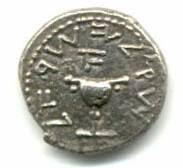The morning of Day 4 was our last morning in Jerusalem.
We got up and headed to the Theodore Herzl Museum located on Mt. Herzl.
Theodore Herzl was the founder of Zionism. As an Austrain journalist, watching the frame-up and trial of Jewish French military officer Alfred Dreyfus, and the outburst of anti-semitism surrounding it, he decided that instead of his previous assimilation beliefs, that the Jews needed their own homeland. He then wrote the book Der Judenstaat, the Jewish State.
The museum is very well done and a fitting tribute to his memory and historical contribution.
It's not just a set of static displays but it tells the story via a video presentation where they tell the story of Herzl through vignettes and the idea of putting on a modern play about his life and educating the actor cast as Herzl on how Herzl would have acted, and a live guide who takes you through the museum:
Theodore Herzl's desk where he wrote Der Judenstaat is on display at the museum.
They also have a collection of the various editions and translations of the book.
Herzl's dream came true after his death, and
After the museum we visited his grave located just outside the museum.
Then on to what was the most emotionally difficult parts of the trip: Yad Vashem. It had changed a lot since my last visit some 25 years ago.
Yad Vashem is the Holocaust Museum.
First you enter the garden of the Righteous of the Nations where the many non-Jews who acted to save Jews during the Holocaust are commemorated.
Then you head into the museum itself.
As you enter, you head into a main corridor, triangle shaped that begins showing footage of Jewish life in Eastern Europe prior to the outbreak of World War 2.
You turn the corner and the triangular corridor leads you to different exhibit halls, each one progressing in time from the rise of the Nazis and loss of Jewish civil rights, through ghettoization and through the final solution and the aftermath. Sobering to say the least. People were weeping openly at parts. In one room they had lists of the various ghettos and the number of dead from each region. I recognized the name of the place where the majority of the family on my mother's side were wiped out. Luckily, her father had left prior to the war, much of his family didn't leave -- and they never would.
In short its not a particularly joyful experience.
The museum continues to wind around the main corridor, ending with the end of World War 2 and then it leads you to the exit:
As you walk through the grey corridor and the dark rooms of the exhibits to the final triangle of the exit, you walk out into the greenery and can see the city of Jerusalem, and if you hadn't before, you understand why Israel must exist.
Then there's perhaps the most sobering exhibit hall remaining - the Children's Memorial. A dark room lit only by a few candles that are reflected with mirrors to appear as millions of points of light and with a sound system that reads the names of all 1.5 million children that died in the Holocaust, their name, age and country of origin are read.
As you leave the memorial, you pass by the Janus Kolchak Memorial:
Janus Kolchak a famous Jewish author and doctor and ran an orphanage in Warsaw for Jewish Children.
When the children were rounded up at the Orphanage to be taken to Treblinka he refused offers to flee away from them and even refused the Nazis offering to have him treated separately but again refused and he and the children boarded the train to their deaths.
A very sobering time and emotionally challenging, but certainly worth visiting and learning.
Then we headed out of Jerusalem towards the south.








2 comments:
Hey Aaron;
Until I went to Dachau, I was an apathetic gun owner, after visiting that camp, it turned me into a believer. That the state had the power to send people to the boxcars and the camps with no recourse for the people was an epiphany for me. I swore that such a thing would never happen here in America and I got involved.
MrGarabaldi: That's one of the reasons why Jews like me own guns - so we can say "Never Again" and mean it - or at the very least make the cost very high.
Post a Comment